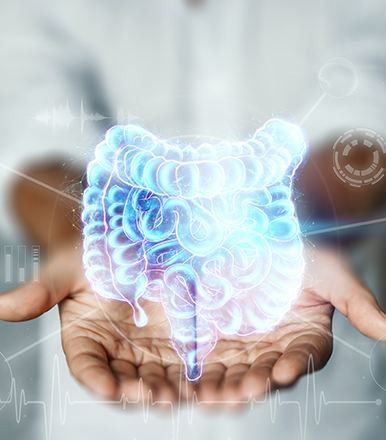Gut Health
The human body is a marvel of complexity, with countless systems and processes, working in harmony to maintain our health. Among these, the gut is a powerhouse that plays a pivotal role in our overall well-being. The gut, often referred to as the gastrointestinal (GI) tract, is a complex system consisting of the stomach, small intestine, and large intestine.
A number of emerging research has shed light on the importance of gut health and its profound impact on various aspects of our health. We have some experts on board to assist us in gaining a better understanding of the topic. Let’s explore the significance of gut health and how it contributes to different health aspects.
- Balancing the whole system - Nutritionist Radha Patil
- Gut Our Second Brain - Dietitian Shalini Bansal
- Unveiling the Power of a Healthy Gut for Radiant Skin and Hair - Dr. Keta Shah
- A Key Preventive Measure for Lifestyle Diseases - Dietitian Amanat Kagzi
Balancing the Whole System

In recent years, the concept of gut health has gained considerable attention in the world of nutrition and wellness. Scientists and healthcare professionals are increasingly recognizing the profound impact that the gut microbiome, the community of microorganisms living in our digestive system, has on our overall health. Understanding the intricate relationship between gut health and nutrition is essential for maintaining a balanced and thriving body. In this article, let's understand the significance of gut health and how nutrition plays a pivotal role in maintaining it.
The Gut Microbiome: A Complex Ecosystem
The human gut is home to trillions of microorganisms, including bacteria, viruses, fungi, and other microbes. This dynamic ecosystem, collectively known as the gut microbiome, plays a vital role in various bodily functions, including digestion, immunity, and even mental health.
So, in that case, overall nutrition of the body plays a very important role in maintaining gut health, let's take a look at that aspect;
Nutrition's Role in Gut Health
The composition and diversity of the gut microbiome are strongly influenced by diet. What we eat directly impacts the balance of beneficial and harmful bacteria in our gut. Here are some key ways in which nutrition affects gut health:
- Dietary Fiber: Fiber-rich foods like fruits, vegetables, whole grains, and legumes are prebiotics—substances that nourish beneficial gut bacteria. A diet lacking in fiber can lead to an imbalance in the microbiome.
- Probiotics: These are live beneficial bacteria found in foods like yogurt, kefir, sauerkraut, and kimchi. Including probiotics in your diet can help maintain a healthy gut microbiome.
- Polyphenols: Found in foods like green tea, berries, and dark chocolate, polyphenols have antioxidant properties and can promote the growth of beneficial gut bacteria.
- Diverse Diet: Consuming a wide variety of foods ensures that different types of beneficial microbes are supported. Mono-diets or highly restrictive eating habits can reduce microbial diversity.
- Limiting Processed Foods: High-sugar and high-fat processed foods can disrupt the balance of gut bacteria and promote the growth of harmful microbes.
- Hydration: Drinking enough water is essential for proper digestion and overall gut health.
Maintaining gut health through proper nutrition is a cornerstone of overall well-being. By embracing a diet rich in fiber, probiotics, and diverse, whole foods while limiting processed options, individuals can cultivate a thriving gut microbiome. A balanced gut not only supports digestion but also plays a critical role in immune function, mental healthcare, and the prevention of chronic diseases. Prioritizing gut health is an investment in a healthier and more vibrant life.
Gut: Our Second Brain

Trillions of bacteria in our gut exert a powerful influence on our brains. Gut bacteria produce neurotransmitters like serotonin, dopamine, and GABA which regulate our mood, memory, motivation, sleep, and appetite. Our gut has a multi-faceted ability to communicate with our brain along with its amazing ability to take care of the body's immune system and digestion. This gut-mind connection is termed the 'Gut Brain Axis'.
Have you ever felt butterflies in your stomach before exams or an interview? Or felt a sudden urge to pass motion when you hear shocking news? This fast impact the mind has on the gut and the gut has on the mind. Stress-induced in the microbiome may affect the brain and behavior. Prolonged stress leads to gut issues like irritable bowel syndrome, diarrhea, chrons and colitis. Also consuming junk food, alcohol, and antibiotics deplete the gut flora, which further negatively impacts our mood. This unhealthy gut leads to anxiety and depression. When the balance between the good and the bad bacteria is disrupted, then various diseases occur, and we start feeling low on mood, anxious, and depressed.
Vegas Nerve, which represents the main component of Parasympathetic Nervous Systems connects between brain and gut. The stimulation of Vagal Fibers influences the brain stem, which plays a major role in psychiatric conditions such as mood swings, post-traumatic stress, and anxiety disorders. Gut bacteria's beneficial effect is on the mood by affecting the Vegas nerve. Other factors that stimulate the Vegas nerve are breathing (pranayama), meditation, yoga, being and exposed to the morning sun.
How to improve gut health?
- Include probiotic food like curd, pickled vegetables, sourdough bread, idli, dosa, and locha.
- Include prebiotic foods like oats, barley, onion, garlic, banana, apple, guava, and root vegetables. Seeds like flax, chia, and basil.
- Limit the consumption of junk food and alcohol.
- Whenever one does a course of antibiotics they must follow it up with a course of prebiotics and probiotics.
" Quite literally, your gut is the epicenter of your mental and physical health. If you want better immunity, efficient digestion, improved clarity and balance, focus on rebuilding your gut health"
Unveiling the Power of a Healthy Gut for Radiant Skin and Hair

In the world of health and beauty, the relationship between the gut, skin, and hair is a complex and fascinating topic. According to new research, a healthy gut can play an important role in promoting radiant skin and healthy hair.
The development of several skin and hair conditions, including acne, eczema, hair fall, split ends, and dandruff, has been linked to the gut microbiome. An imbalanced gut microbiome or unhealthy gut can cause increased inflammation in the body, triggering or exacerbating these skin and hair conditions. Furthermore, your gut is thought to play a role in acne development because certain strains of bacteria in the gut can produce inflammatory compounds that contribute to acne formation.
A healthy diet and proper nutrition are essential for maintaining a healthy gut, as well as glowing skin and hair. Thus, eat a variety of whole and nutrient-dense foods, Including prebiotics and probiotics. Reduce your intake of processed and sugary foods, and stay hydrated.
A Key Preventive Measure for Lifestyle Diseases

Non-communicable diseases (NCDs) have become a pervasive health issue worldwide, with lifestyle habits being a significant contributing factor. However, one often overlooked aspect of maintaining good health is taking care of our gut. Gut-health management is emerging as a vital preventive measure for lifestyle diseases, providing a holistic approach to overall well-being.
The gut microbiome, comprised of trillions of microorganisms in our digestive system, plays a fundamental role in our health. Imbalances in the gut microbiome have been linked to a range of issues, including weight management problems, type 2 diabetes, non-alcoholic fatty liver disease (NAFLD), and even colorectal cancer. In recent years, studies have also highlighted the intricate connection between gut health and mental well-being.
Research suggests that nurturing a healthy gut involves several lifestyle and dietary changes. Here are the key strategies for effective gut health management:
- Eat a diverse and balanced diet: Consuming a wide variety of foods helps maintain a healthy gut. Including fermented foods like yogurt, kefir, sauerkraut, and kimchi can introduce beneficial bacteria into the gut. Whole grains, fruits, vegetables, and plant-based proteins should also be staples in your diet.
- Increase fiber intake: Fiber-rich foods support a healthy gut microbiome. Aim for a daily intake of at least 25-35 grams of fiber from sources like fruits, vegetables, whole grains, legumes, and nuts. Consuming more soluble and insoluble fiber can regulate bowel movements, nourish gut bacteria, and reduce the risk of gastrointestinal disorders.
- Prioritize stress management and sleep: Stress and a lack of sleep negatively impact gut health. Engaging in stress-reducing activities such as mindfulness practices, exercise, and adequate sleep can improve gut function and promote the growth of beneficial bacteria.
- Stay hydrated: Drinking an adequate amount of water supports a healthy digestive system. It aids in the breakdown of food, absorption of nutrients, and elimination of waste. Aim for at least eight glasses of water per day to maintain optimum gut function.
- Avoid processed foods and excessive sugar: Highly processed foods, laden with additives and preservatives, disrupt the natural balance of gut bacteria. Likewise, excessive sugar consumption can lead to an overgrowth of harmful bacteria in the gut. Opt for whole, unprocessed foods and reduce your intake of added sugars for a healthier gut.
- Consider probiotic and prebiotic supplements: In some cases, supplementation with probiotics (live beneficial bacteria) and prebiotics (dietary fibers that nourish gut bacteria) can help restore gut health. Consult a healthcare professional or nutritionist to determine the right supplements for you.
Taking care of our gut health is undeniably a crucial preventive measure against lifestyle diseases. By incorporating these strategies into our daily routine, we can foster a healthier, diverse gut microbiome, and boost our overall well-being.
Ensuring a healthy gut is an essential aspect of preventing lifestyle diseases. Through a balanced diet, increased fiber intake, stress management, hydration, and avoiding processed foods, we can create a flourishing gut microbiome. By making conscious choices and embracing gut-health management, we take an active step towards a healthier future.
In conclusion, gut health is a fundamental pillar of overall well-being. By nurturing a healthy gut through lifestyle choices and dietary habits, individuals can take proactive steps to enhance their quality of life and reduce the risk of chronic diseases. Recognizing the significance of the gut-health connection is a crucial step toward achieving optimal health and wellness.
Check out Hello Fitness Magazine. There is never a wrong time to go on a fitness quest. Contact us and allow us to assist you in leading a better lifestyle. Follow us on Instagram. We share the best Health & Fitness related Articles for information based on healthy eating, health and fitness recommendations, health problems and their solutions, human body fitness, and much more.











